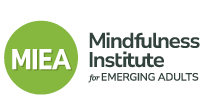Cultivate Student Well-Being with MIEA: Special Offer for JED Members
In the ever-evolving landscape of higher education, the challenge of student stress and burnout has never been more acute. The Mindfulness Institute for Emerging Adults (MIEA) (formerly Koru Mindfulness) stands at the forefront of addressing this challenge, offering a proven solution through our evidence-based curriculum designed to cultivate resilience and well-being among college-aged students.
Our program empowers educators to guide students from feeling stressed and burnt out to capable and resilient, equipping them with practical mindfulness and meditation techniques within a supportive, small-group learning environment.
Exclusive Offer for JED Members
Start your journey with the MIEA Fundamentals Course or elevate your skills through our Teacher Certification Program.
As a valued JED member, you are entitled to a 10% discount on these life-changing opportunities. Use the promo code “JED” for our Fundamentals Course or mention your JED membership during application for the Certification Program.
Why Choose MIEA?
Evidence-Based Curriculum:
Our curriculum, developed at Duke University and lauded for its impact, is the cornerstone of our approach, proven to enhance well-being and resilience across more than 300 universities worldwide.
Empowered Educators:
Join our global network of over 1,500 teachers who are making a lasting difference in the lives of over 70,000 students by fostering environments of mindfulness and compassion.
Practical & Accessible:
Designed for the busy schedules of both students and educators, our programs emphasize practical tools and supervised practice, aligning with the American Council on Education’s findings on effective mental health interventions.
Together, we can transform the educational landscape into one where well-being and resilience are at the heart of the student experience. Join us in this mission and take advantage of your exclusive JED member discount today.
For more information and to begin your journey, visit MIEA.com.


